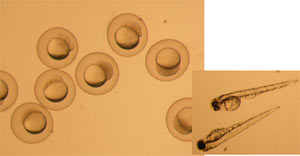
エストロゲンはアロマテースの働きによりアンドロゲンを基質として産生されるステロイドホルモンであり、一般的には、卵巣で産生される生殖に関わる女性ホルモンとして知られている。一方、エストロゲンは脳においても産生され、ニューロンの成長分化、保護、可逆性等に作用している。魚類には脳型および卵巣型のアロマテース遺伝子があり、脳では主に脳型アロマテースが発現する。本研究で用いるゼブラフィッシュでは受精後24時間以降脳アロマテースの発現が急激に上昇することから、エストロゲンと脳初期発生の研究に適している。私たちは以下のテーマを中心に、エストロゲンが神経調節因子として働くメカニズムについて研究している。


Estrogen formation is catalyzed by cytochrome P450aromatase from androgen. Although estrogen is generally regarded as a reproductive hormone produced in the ovary, it is also known to be produced in the brain, where it functions as a neuroregulatory factor for neural growth, differentiation, protection, and plasticity. Fish has two distinct aromatase isoforms, brain and ovarian types. Brain aromatase is mainly expressed in the brain. Zebrafish which we use in our study, shows a dramatic increase in expression of brain aromatase in embryos after 24hpf, which makes zebrafish as a suitable model to study roles of estrogen in neural development. Our projects are: